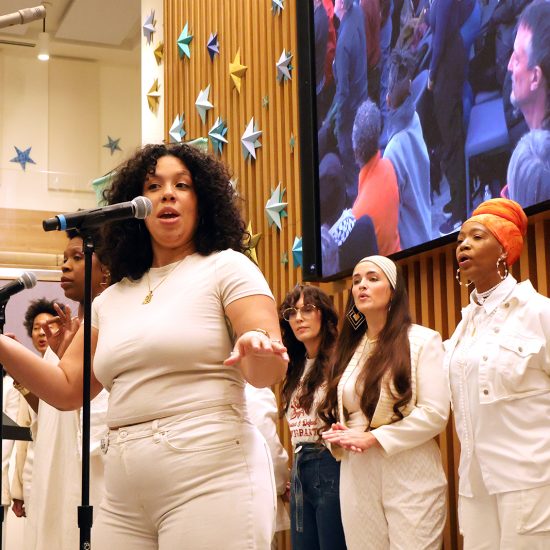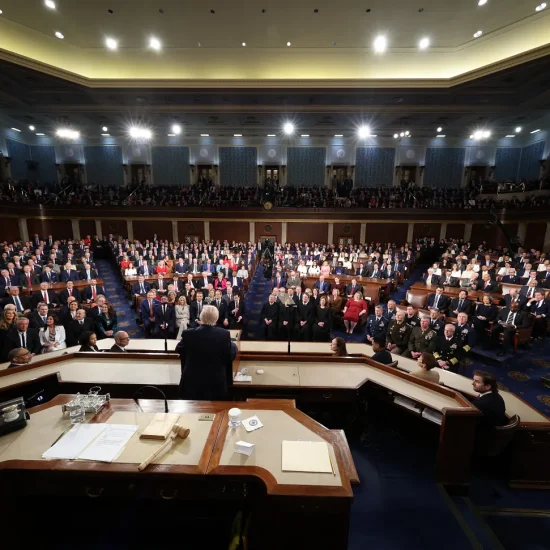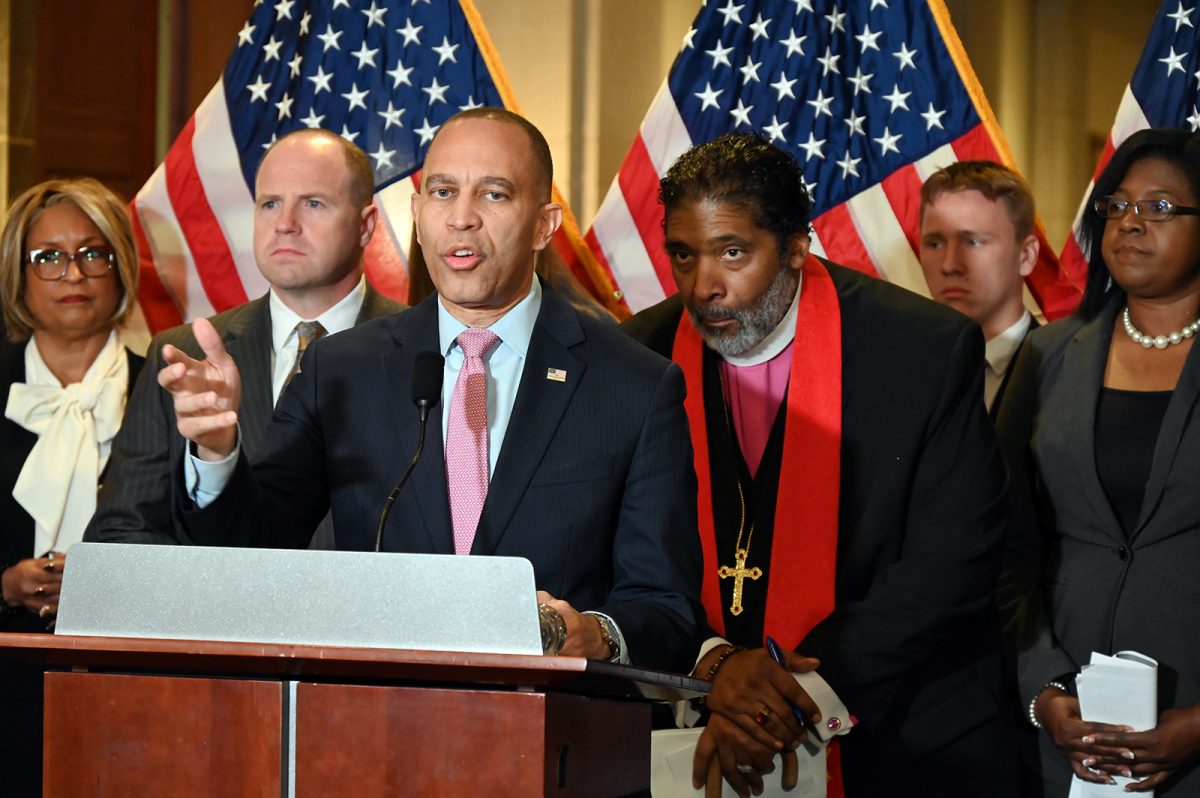
WASHINGTON (RNS) — House Minority Leader Hakeem Jeffries and other Democrats joined faith leaders on Thursday (Oct. 30) to pray and speak against the dangers of health care cuts and allowing government assistance programs to expire during the ongoing government shutdown.
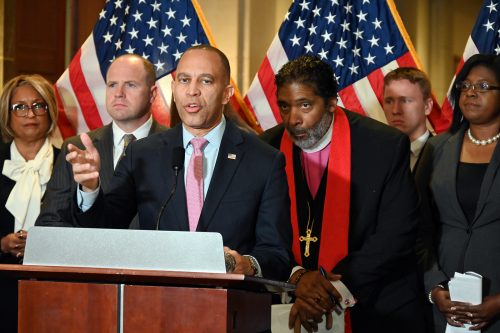
House Minority Leader Hakeem Jeffries, D-N.Y., speaks during a news conference on the 30th day of a government shutdown, on Capitol Hill, Oct. 30, 2025, in Washington. The Rev. William Barber II stands beside Jeffries. (RNS photo/Jack Jenkins)
“We will not retreat, and we will use every nonviolent tool at our disposal to call this nation, this Congress, to stop all of this partisan fighting and get down to the business of the people,” said the Rev. William Barber II, a prominent social justice activist, at a press conference on Capitol Hill. “Open this government so that you can open up good news for the poor.”
Barber was echoed by Jeffries, who accused Republicans of committing “policy violence” by cutting Medicaid spending earlier this year with the passage of the “Big, Beautiful Bill” — which Barber vigorously protested, resulting in his arrest at the U.S. Capitol in April.
Jeffries then pivoted to an issue Democrats argue is at the center of the nearly monthlong government shutdown — a dispute over whether to extend health insurance subsidies that are set to expire at the end of the year.
“The refusal to extend the Affordable Care Act tax rates, the unwillingness to find a dime to meet the health care needs of the American people, when some folks can find $40 billion to bail out a right-wing dictator in Argentina — that’s policy violence,” Jeffries said, referring to President Donald Trump’s decision to authorize up to $40 billion in a bailout package to help address Argentina’s economic crisis.
Jeffries and Barber were joined by other Democratic lawmakers, such as Rep. Steven Horsford of Nevada, as well as an array of faith leaders from a range of traditions and organizations, such as the National Council of Churches, United Methodist Church, Disciples of Christ, and the Union for Reform Judaism.
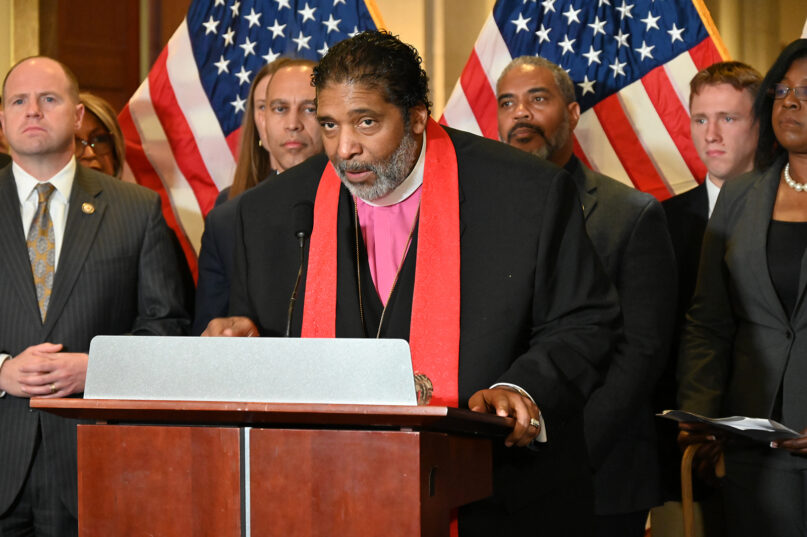
The Rev. William Barber II speaks during a news conference on the 30th day of a government shutdown, on Capitol Hill, Oct. 30, 2025, in Washington. (RNS photo/Jack Jenkins)
Republicans such as House Speaker Mike Johnson have accused Democrats of using the fight over health care subsidies as a foil, arguing they are instead refusing to open the government because liberal leaders are afraid of angering the “radical, far-left voices in their party,” Johnson said in a news conference.
But the religious leaders gathered on Capitol Hill — some of whom, like Barber, have long advocated for greater access to health care — insisted the subsidies issue was paramount. Among their delegation were at least three people who said they stand to be directly impacted by policy changes, including if the subsidies expire.
Lawmakers and faith leaders also highlighted concerns about the looming threat of allowing Supplemental Nutrition Assistance Program benefits, formerly known as food stamps, to lapse, as they are set to do on Saturday if the government does not reopen or other measures are not taken. The press conference was happening at the same time as a legal hearing over the Trump administration’s decision to not draw on emergency funds to help cover SNAP benefits in November.
The Rev. Ryan Stoess, a United Methodist Church pastor from Louisville, Kentucky, was asked to pray for the group over the lawsuit.
“God, we lift up the court hearing that is happening … at a time when we are holding food over the heads of poor people so that we can take away their health care,” Stoess said. “God help us.”
He added, “When the cruelty is the point, when the cruelty is in our face, God give us your mercy.”
In a separate interview with Religion News Service, Stoess said a series of GOP-led policy decisions are having a compounding effect on impoverished people in his community. In addition to hosting traditional worship services, his Church of the Promise has long offered a pay-what-you-can restaurant, a nonprofit construction group to help build housing, an outreach effort to unhoused people, an addiction recovery program, and early childhood development programming, he said.
Stoess said members of his staff broke down in tears this week as they began reckoning with the reality that SNAP benefits will likely expire for many they serve. Meanwhile, food banks across the country, many of which are faith-based, are bracing for a massive increase in people seeking food if SNAP benefits expire.
Stoess joined others in warning that outfits like his likely will not be able to handle the influx of people seeking services, should the benefits expire. He said that while many people pay for food at his church’s restaurant by offering to clean dishes, the number offering to do so has risen throughout the year — and likely will increase even more if SNAP benefits dry up.
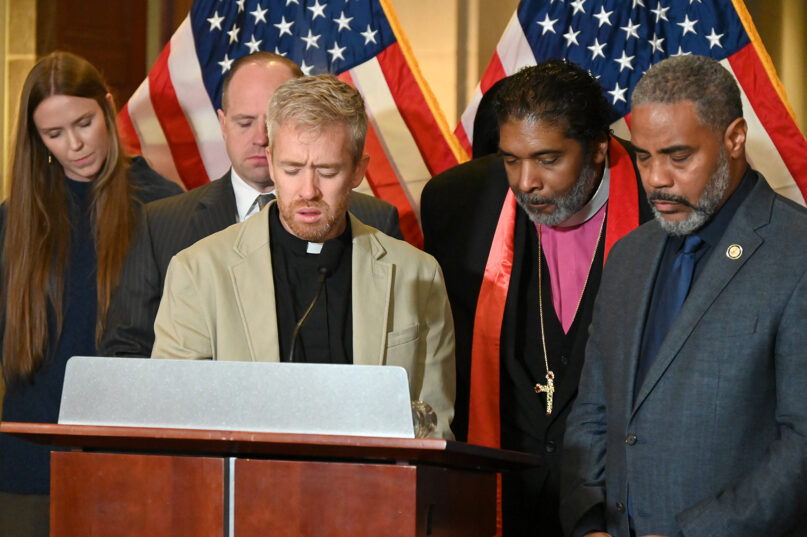
The Rev. Ryan Stoess leads a prayer during a news conference on the 30th day of a government shutdown, on Capitol Hill, Oct. 30, 2025, in Washington. (RNS photo/Jack Jenkins)
Rabbi Esther Lederman, who was part of the faith delegation, noted another dynamic impacting people at a congregation she attends in Washington, D.C.: government workers who have been furloughed during the shutdown. She said her Jewish faith compels her to advocate for them, along with others in need.
“Fighting for health care has been part of our core understanding of what it is to be an American Jew,” she told RNS.
Barber also railed against the idea that food banks and churches could step in to fill the gap left if SNAP benefits expire, saying it’s a “lie” perpetrated by devotees of “extremism, religious nationalism and MAGA.” Impoverished Americans are being hit with a growing list of problems created by lawmakers, he said.
“One minute you can’t eat. The next minute you can’t get your medicine. One minute you’re scared to go to the hospital. The next minute, you’ve got to pay higher prices, then somebody dies — because food and health and health care are all connected,” Barber, who himself suffers from a chronic illness, said in an interview. “You’re creating anxiety, you’re creating burdens.”
Whether the courts will intervene to force the administration to dole out funds to cover SNAP benefits remains an open question, but Barber said he plans to stage protests centered on the plight of poor Americans later this year. He said he is in talks to coordinate his massive “Moral Mondays” demonstrations with the group Indivisible, which helped organize the No Kings protests, and hopes to hold a large prayer vigil in front of the U.S. Capitol.
Referring to the concept of a “fellowship of suffering,” drawn from the Book of Philippians, Barber said he interprets it to mean that suffering “forces a coming together and a standing up like we’ve never seen before.” He said he hopes that kind of effort would be enough to turn the hearts — or at least the votes — of many in Congress.
“There are forces that live in such a mythology of what it means to be human that they think power is to be used and measured by how many people they hurt, and how many people they make rich, rather than how many people they heal and how many people they lift up,” he said.


